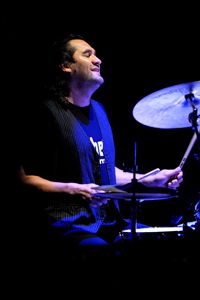Don't see what you're looking for?
Main Site
Berklee.eduCampuses and Schools

Sergio Bellotti
For media inquiries, please contact Media Relations
- Writer for Drum Club magazine in Italy
- Faculty at the Conservatorio della Svizzera Italiana (Lugano, Switzerland)
- Web lessons artist for VicFirth.com and Sergio Bellotti's own iPhone/iPad app
- Performances at the Montreal Drum Fest 2003; Cape Breton International Drum Fest 2004, 2005, and 2006; Berklee World Percussion Festival 2005 to 2014;PASIC 2005 and 2009, Kosa Festival 2009 to 2013; Bari in Jazz Festival 2010; Beantown Jazz Festival 2010; and Somerville Jazz Fest 2014
- Recording and/or performances with Nathan East, Robben Ford, Bob James, Wayne Krantz, Tom Scott, Dan Siegel, Rocco Ventrella, and Mike Stern, among others
- Cofounder of the fusion group Spajazzy
- Member of WeJazzUp
- Emcee for the official Joe Morello Tribute Memorial concert
- Coleader of a duo with percussion virtuoso Alessandra Belloni
- Endorsements include Yamaha Drums, Vic Firth Sticks, RemoDrumheads, Zildjian Cymbals
- Recordings include 1-11 and Spajazzy as a leader; Perils and Thrills, LittleHorse; Live at Montreal Drum Fest DVD; The Rhythm Is the Cure DVD; Mastering the Bass, Bruce Gertz; Centro Asociale, Marco Bellotti; Sweet Temptation, Rocco Ventrella; Metropolis, Igor Gerzina
- Berklee College of Music
- Diploma, Accademia Bia, Italy
"My teaching approach is very practical; I'm not much into intellectualizing the music. I like to put my hands on the instrument with them and act like a sort of a coach on the field. I also believe our best teacher is our own body. Repetition will actually empower your body and teach you the most effective way to do what's best for you. And the drums are very physical, so when we sweat for half an hour, the body is sending messages about what to do and what not to do. It's like learning how to whistle. I wouldn't be able to teach you how to whistle. You have to try to imitate me till you get it."
"I stress repertoire a lot. I want all of my students to get a good grasp of the repertoire, and to learn the history of music in many styles. I'd like them to get down to the roots and analyze what happened before, because by studying the history we can project the future a little bit and be better prepared for what is going on now."
"My job is to help my students study positively, and try to give them that energy to make practicing a joyful experience. From what could seem to be the most boring exercise to the most beautiful piece of music, I want to make sure that everything is done with joy. So even if the student is a beginner and can only play two bars, I want him to play those two bars over and over with a musical attitude. I want them to excel at a 'Carnegie Hall' level with those two bars, and make it sound like a piece of music. Once they get that, the next two bars are going to be a little easier."
"I would also want my students to feel genuine passion for music. I'm fortunate to be exposed to music; I want other people to be exposed to it and love it as much as I do. Music has brought so many positive things in my life, professionally and non-professionally, and I definitely want to share that. It's a joyful event."